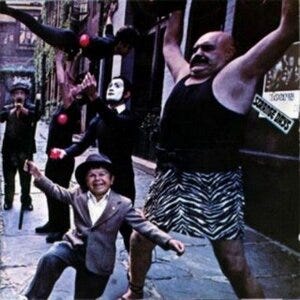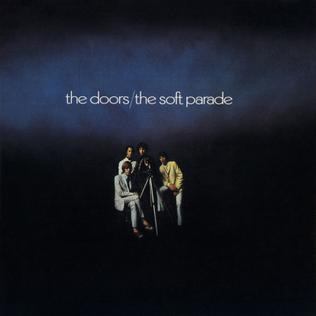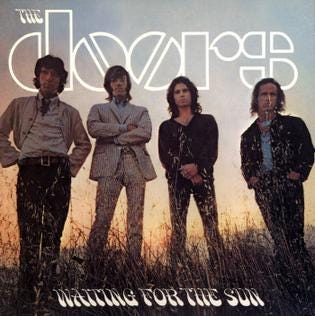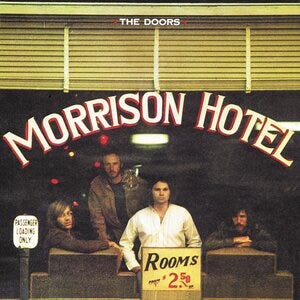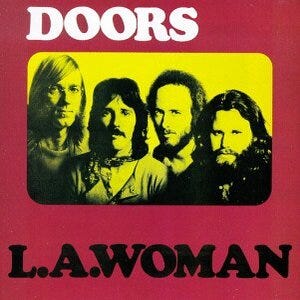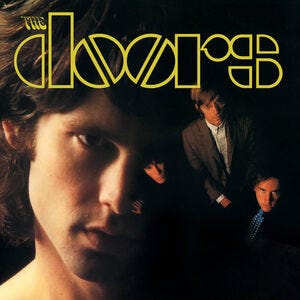The Doors discography: Ranked
Ray Manzarek, Robby Krieger, and John Densmore's six albums that include controversial frontman Jim Morrison before his untimely death, in the undisputed and objective order of excellence
Jim Morrison was one of the most famous (or perhaps infamous) frontmen in the history of rock music; frontman of both The Doors, and alongside a few others, one of the most notable members (frontmen) of The 27 Club. His death in July of 1971, at just 27 years old, truly rocked the world (no pun intended). After years of controversial performances under the influence of drugs and alcohol, erratic onstage behavior, and lyrical and poetic genius, Morrison left his rather large mark on the world of music on his tragic and fittingly unexpected way out. From 1967 to 1971, The Doors released six full length albums, most of which are absolute masterpieces. That said, no two masterpieces are alike, and some are most definitely better than others; The Doors’ six albums are no exception to that rule.
Strange Days (1967)
I don’t think I can stress enough—all six of these albums, this one included, are fantastic. Strange Days just happens to be slightly below the other five. I wouldn’t say there are any duds on this album, but there are some songs that fall a little flat compared to the standard set by their debut album. In defense of this album, it’s almost typical for a sophomore album to fall short of a debut, so much so that fans come to expect it. But had Strange Days been their third album, or their debut, I actually think it would have been more widely regarded as one of their better albums. “People Are Strange” is an absolute hit, in many cases one of the first songs one may think of when they think of The Doors. “You’re Lost Little Girl” is perhaps my favorite of this album; I think it’s as great a track as “People Are Strange,” and “Love Me Two Times” is equally great. That said, those three, along with the title track, are definitely the most notable on this album, and carry a lot of the album’s weight on their collective shoulders. A lot of the rest of the tracklist sort of blends together. Morrison’s signature sermon-esque track “Horse Latitudes” is of course a pretty great track but that’s almost by default given his affinity for such songs. “Unhappy Girl” actually sounds to me a little too similar to the track “I Looked at You” from their debut album, and not in a way that feels intentional. “When the Music’s Over” is a great album closer that leaves a bit of a deceivingly good taste in your mouth, which I think is also a large part of why I I do still love this album and listen to it pretty regularly. I just don’t think it reaches the same level of excellence as the other five albums.
The Soft Parade (1969)
“Tell All the People” and “Touch Me” are probably two of the greatest Doors songs ever written. Unfortunately, that is to the detriment of the rest of The Soft Parade. This album comes in so hot, but that level of pure excellence just doesn’t stick around for the rest of the album. “Shaman’s Blues” is a an okay track, but it’s nowhere near as great as “Touch Me” and “Tell All The People.” “Do It” is also a pretty good song, but again, nowhere near as great as “Touch Me” and “Tell All The People.” “Easy Ride” same deal, and so on and so on. “Runnin’ Blue” is a pretty great track, but I fear that may be in large part due to the chorus where Robby Krieger is featured on vocals and channels Bob Dylan—so much so that I, along with many others, actually believed it to be Dylan upon first listen. It’s worth noting that “Runnin’ Blue” also sounds relatively similar to the prior track “Wild Child,” at least in its intro, but it feels much more intentional given that they’re back to back tracks, so at least that shows a little growth from that same situation on Strange Days. “Wishful Sinful” is a stronger track than most of the middle tracks on this album, with some pretty great guitar licks, and the title track is a pretty fantastic closer, with what may be one of the most iconic Morrison sermon-esque lyrical rants: “When I was back there in seminary school / There was a person there / Who put forth the proposition / That you can petition the Lord with prayer / Petition the Lord with prayer / Petition the Lord with prayer / You cannot petition the Lord with prayer!” Though not quite as strong as the two song opener to this album, to its credit, the two song closer to this album does combat the mediocrity of the middle tracks.
Waiting for the Sun (1968)
I think Waiting for the Sun marks a pretty stark turning point as far as this specific ranking of albums goes. Where Strange Days and The Soft Parade are both very good albums, Waiting for the Sun is, in my opinion, leaps and bounds ahead. There is not a single song on this album that isn’t great. It’s clear that after the sophomore slump that was Strange Days, Waiting for the Sun was a pretty nice recovery. For starters, I think “Hello, I Love You” might be the greatest opener on any of these six albums. A bold claim, I know, but I stand by it. “Love Street” is an equally fantastic track, and creates a nice juxtaposition between the erratic outro vocals on “Hello, I Love You” and the soft, melodic vocals that kick off the second track. “Not to Touch the Earth,” specifically in the vocal patterns, is a testament to their mastery of the eerie and the weird—probably the vibe they were going for with a lot of the tracks on Strange Days but that they couldn’t quite master until now. From there, they ease into “Summer’s Almost Gone” which also exemplifies the eerie and the weird, but more heavily in the guitar rather than the vocals. Neither, however, are nearly as weird and eerie as “The Unknown Soldier,” which is kind of a tasteful jumbled mess of sound, reminiscent of a lot of the weird and eeriness of one of my all time favorite albums, Pink Floyd’s The Wall. “Wintertime Love” is a personal favorite, because it really speaks to the poet in Morrison. I’m a sucker for a good love poem, and I think this song is exactly that. “Spanish Caravan,” as one would expect given the title, is a beautiful guitar showing, with a Spanish-inspired intro that lasts a full minute. “My Wild Love” and “We Could Be so Good Together” are both classic Doors tracks, acting almost as the band’s signature in the bottom corner of the artwork. “Yes, the River Knows” is another one of my favorites on this album because I think it highlights the rest of the band’s excellence. Jim Morrison is a fairly dominant frontman, so it’s rare that any given track isn’t dominated by his vocals, but I think the beauty of this song is that it is equal parts keys, drums, guitar, and vocals. And of course, the album closer, “Five to One,” which, for whatever reason, is my most memorable track from The Doors (the biopic film with Val Kilmer). It’s erratic, wild, and an absolute trip of a song, perfectly closing out an absolute trip of an album.
Morrison Hotel (1970)
I’ve gone back and forth so many times trying to decide whether to put this album at #2 or #3, and ultimately, in an attempt to be objective, I settled for bronze for this one. That said, I think Morrison Hotel might be the album I listen to the most, in no small part due to the facts that 1. “Peace Frog” is probably my favorite Doors song (more on that in a few sentences), and 2. this is my favorite album cover. There is also a clear shift here in terms of greatness; Waiting for the Sun is a fantastic album no doubt, and still miles ahead of Strange Days and The Soft Parade. But Morrison Hotel, along with the next two albums, might be one of the greatest albums ever made. Every single track on this album is truly a piece of art. “Roadhouse Blues” is a hell of an opener (and a glaring oversight on my part in my last post) and a great example of The Doors versatility as they grew and evolved as a band. Funny enough, “Waiting for the Sun,” isn’t on that album, but is a great addition to this one, with one of the most iconic riffs throughout all of their discography. Next up is yet another iconic riff, both guitar and keys, in “You Make Me Real” which is a song reminiscent of ‘60s blues rock, and a fantastic blend of what was to come in the ‘70s. “Peace Frog” was the first Doors song I remember hearing and liking as much as I did, I don’t recall exactly where or when I first heard it, but the lyrics “There’s blood in the streets it’s up to my ankles / Blood in the streets, it’s up to my knee / Blood in the streets, the town of Chicago / Blood on the rise, it’s following me” have stuck with me for well over a decade if I had to guess. I’ve also always been fascinated with songs whose titles make no appearance in their lyrics, and with a title as sick as “Peace Frog,” this one most definitely topped that list from the moment it first struck my ears. “Blue Sunday” is another poetic love ballad that speaks to the writer in me, though not in the lyrics (which are still beautiful, just fairly simple) but in the melody. Similar to “Peace Frog,” “Ship of Fools” is a powerful song with political undertones that truly defined the greatness of The Doors at the time. “Land Ho!” is, if nothing else, just fun, and truth be told, if it was written by anyone else, I probably wouldn’t even give it a chance, but because it’s Jim Morrison singing, and because it has so much Doors flare in its bones as a song, it’s probably one of my favorites on this album. “The Spy” is another nod to the eerie and the weird, which isn’t really all that present throughout the rest of this album, but which is absolutely needed on at least one track in every Doors album. “Queen of the Highway” is another classic Doors track, with Morrison’s soothing deep vocals at the forefront, as is “Indian Summer.” It’s similarly eerie, but not in a weird way, rather in a sing and coo one to sleep kind of way. And “Maggie M’Gill” is a perfect closer to this album, with yet another iconic and unmistakable guitar lick dominating the track. This album clearly has a myriad of genre influences, and I’d say it’s probably the most fraught of all The Doors albums as far as all the different vibes present in each track, and in contrast from one track to the next.
L.A. Woman (1971)
I know a lot of people regard this as their best album, and while I wouldn’t hard disagree, I really did want to rank this one below Morrison Hotel—though not at all to the discredit of L.A. Woman, which is as masterful a sequence of ten tracks as any album, Doors or otherwise, could be. “The Changeling” gives “Hello, I Love You” a run for its money as the greatest Doors album opener, and as it continues into “Love Her Madly,” it’s a hell of a start to The Doors’ final album. The keys on each of these songs are truly immaculate, fighting like hell to keep their share of the spotlight, and honestly probably winning. If they any doubt, however, that Morrison’s vocals might be giving up said spotlight, “Been down so Long” squashes that. I think the intro vocals on this track are about as strong a vocal start as any Doors song throughout their six studio albums, and this song does a great job of exemplifying Morrison’s range as a vocalist, from the throatiness all the way through his range to the soothing bass. “Cars Hiss by My Window” checks the blues box, with a typical blues riff that transports you to a wide open field on the countryside. And of course, the title track, the pièce de résistance, “L.A. Woman,” with perhaps the single most iconic guitar riff throughout The Doors career, alongside perhaps the most iconic lyrics as well: “Well, I just got into town about an hour ago / Took a look around, see which way the wind blow / Where the little girls in their Hollywood bungalows / Are you a lucky little lady in the city of light / Or just another lost angel, city of night.” Though I’ve never been to LA, I can only imagine these lyrics are as integral to the city’s identity as the lyrics of “Empire State of Mind” are to New York. This song is a nearly eight minute journey, and acts as a bittersweet culmination of Jim Morrison’s career and life as a rock ‘n' roll mastermind, as it also features the lyrical tribute to “Mr. Mojo Risin,’” Morrison’s famous anagrammed alter ego. This song is a large part of why so many regard L.A. Woman as the greatest Doors album, and even perhaps the greatest rock album of all time, and it’s also a large part of the reason why I wouldn’t argue. “L’America” and “Hyacinth House” might be my two favorite tracks on this album, because they’re both so clear an explanation of The Doors entire musical identity. They’re two wildly different tracks, but between the two of them, they encompass both the eccentricity of the band, as well as the borderline easy listening and soothing quality of Morrison’s vocals in tandem with their truly unique sound created by the combination of keys, drums, and guitar. “Crawling King Snake” is another weird one that I think would’ve been a top five pick to see performed live. It has an almost jazz-like quality at times, while maintaining the bluesy integrity of the band sans vocals. “The WASP (Texas Radio and the Big Beat)” is another classic blues track, but of course, with a clear and distinct Doors flare. This one is the closest thing to a Morrison sermon which is noticeably absent from this album, though shockingly I don’t think that absence detracts from the album’s excellence at all. And where “Hello, I Love You” is the greatest Doors album opener, “Riders on the Storm” is probably an equally incredible album closer, rivaling “L.A. Woman” as the greatest Doors song ever written. Though I think it is narrowly beaten out by their self-titled album as the best Doors album, L.A. Woman is about as perfect an album as you can get, and as the culmination of The Doors as a foursome, I have absolutely no complaints.
The Doors (1967)
There’s a reason The Doors rose to such wild levels of fame in such a short amount of time (four years’ worth of music putting a band on the radar of such a mass of listeners, especially before the existence of not only streaming but the fucking CD itself) and that reason is their self-titled album. Though I wouldn’t argue that L.A. Woman is one of the greatest rock albums of all time, I would insist that one cannot make that claim without including The Doors as well. Every single one of these eleven tracks is a masterpiece in and of itself, and when compiled together into an LP, there is simply nothing like it. “Break on Through (To the Other Side)” is a hell of an introduction to the band as a whole, the lyrics themselves are pure poetry, and the way Morrison nearly shouts them is unlike anything that had ever been done before; I can only imagine what it must’ve been like to purchase that vinyl and hear this song for the first time, not even knowing what to expect in the first place. “Soul Kitchen” is a crazy juxtaposition, going from Morrison’s insane vocal performance to a more laidback, keyboard heavy track that one might hear in a classic speakeasy. “The Crystal Ship” is the first instance of that eerie weirdness that came to be so characteristic of The Doors throughout their four years, it’s almost hard to believe that it’s the same guy singing here as in “Break on Through (To the Other Side).” “Twentieth Century Fox” is the classic Doors vibe that is honestly difficult to put into words, but that one recognizes immediately. Morrison, Manzarek, Krieger, and Densmore all shine in this one, and I think that’s the best way to articulate that classic Doors feel. “Alabama Song (Whisky Bar),” similar to “Land Ho!” on Morrison Hotel, is just a fun track: weird, bluesy, and classic, and followed by “Light My Fire,” this exact moment on The Doors is what sold me on them as a band. There is really no one like them, and no matter how controversial they may have been (and still sometimes are), each time I encounter this moment on this album I’m reminded of why they have become one of my absolute favorites and have really dominated my listening history in recent years. “Light My Fire” has an iconic an intro as any of their other tracks, and I think it would be the song I point anyone to as an introduction to The Doors. I remember watching the Val Kilmer biopic and this song really sticking out to me as Morrison was just starting out, taking his poetry and transforming it into music. Though I have never really explored music as a medium for my own writing, I really resonated with the way Morrison did exactly that, and I think this song is a big part of why. “Back Door Man” is another erratic one that’s equally dominated by Morrison’s vocals and Manzarek’s keys, and I think that’s yet another reason why there is really no one like The Doors. Their most iconic tracks are fronted not by vocals and guitar as many ‘traditional’ rock acts are, but by the combination of vocals, guitar, drums, and keys with a highlight on the keys which might be even stronger than the spotlight on the guitar and drums. Almost like a game of ping pong, the next track, “I Looked at You,” is another more laidback one in comparison to “Back Door Man.” There are certainly some moments throughout this song, namely when Morrison sings the chorus “And we're on our way / No, we can't turn back / Yeah, we're on our way / And we can't turn back,” but all in all, this song features more of his soothingly deep vocals than the loud throaty ones. “End of the Night” is another eerily weird one, which is likely the song that prompted their attempt at continued oddity in Strange Days, because they truly did it so well in this track. I won’t lie, if I heard this song at night in a dark and unfamiliar place, I would be pretty damn spooked. “Take It as It Comes” is, admittedly, the weak link on this album, but it’s still a great track, its merit lying comfortably in the fact that it is yet another Doors classic, the foursome relishing in doing what they do best. Rounded out by the track that created one of, if not the single most infamous moment in all of rock ‘n’ roll history, and part of what makes this album such a flawless debut, “The End.” Anyone who was alive in 1970, and anyone who has seen The Doors film, knows the exact moment that sparked the largest Jim Morrison controversy and ultimately, the start of the end (again, no pun intended) of The Doors. In New Orleans, December of 1970, Jim Morrison made a complete and utter spectacle during this song that caused them to cease performing live, just seven months before he was found dead in the tub. If you haven’t seen the movie, I can’t recommend it enough—it’s actually the film that sparked my love of biopics. Another bold claim but I don’t think this one can really be disputed: there has never been a stronger motif throughout the history of music than “The End” was for The Doors—album, film, and band itself. It is a masterful eleven minute musical compilation, and is the perfect end to the perfect album.
It seems fitting that The Doors’ greatest two albums (and yes, this is objectively speaking) are their first and last albums. Even though some small aspects of their discography may not have aged flawlessly, all in all, their music is timeless, and there’s a reason this band’s merchandise is still being produced and sold by modern retailers five full decades after Morrison’s death. This band is special, and as a music lover and a writer, I don’t think there is any rock artist that even touches the level of uniqueness and excellence of The Doors. Let this be my plea to close out this ranking: if you don’t already, listen to The fucking Doors. They are really and truly something special.




